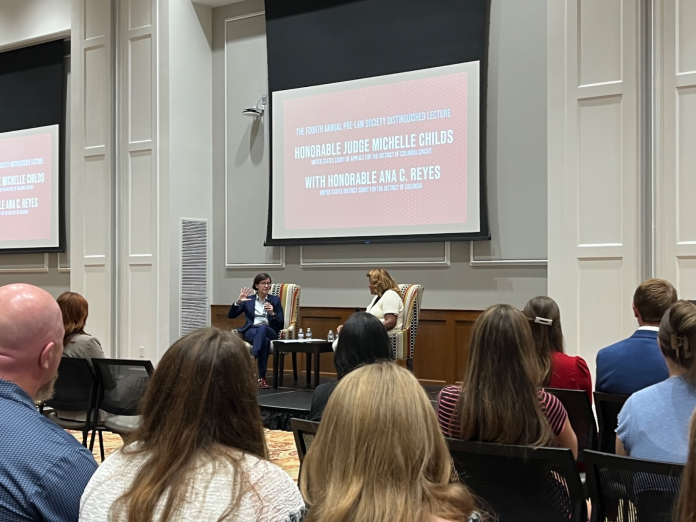The Transylvania and Lexington community had the opportunity to engage in a thought-provoking conversation with Judge Michelle Childs, currently serving in the U.S. Court of Appeals for the D.C. Circuit, at a recent event hosted by the university’s Pre-Law Society. The event was moderated by TU alum Judge Ana C. Reyes, a U.S. District Court Judge for the District of Columbia.
Judge Childs, widely respected for her measured and human-centered approach to the law, shared reflections on her journey through the legal system, from her early years in South Carolina to her current role on one of the most powerful appellate courts in the country.
Born in Detroit and raised in South Carolina, Childs graduated top of her high school class. She was a first-generation college student, earning her undergraduate degree in management from the University of South Florida. She went on to complete both a J.D. and an M.A. in personnel and employment relations at the University of South Carolina in an accelerated three-and-a-half-year dual-degree program. Later, she earned an L.L.M. in judicial studies from Duke University.
Childs began her legal career practicing labor and employment law in South Carolina at Nexsen Pruet. She became a partner in just seven and a half years, becoming the first Black woman to be named a partner at a major law firm in the state. Her career then took a turn toward public service when the governor appointed her as deputy director in South Carolina’s Department of Labor. She subsequently served as a Commissioner on the South Carolina Workers’ Compensation Commission, and later was elected as a state circuit court judge.
Childs was nominated by President Obama in 2009 to serve as a U.S. District Court Judge for the District of South Carolina, a role requiring Senate confirmation. In 2022, she moved up to the D.C. Circuit Court of Appeals, after a “vitriolic” confirmation process that drew bipartisan support—including from Republican Senator Lindsey Graham, who she believed affirmed her qualifications to his fellow Republicans.
In her appellate role, Judge Childs has been involved in several high-profile cases, including the initial Trump presidential immunity case, litigation involving Holocaust survivors, Guantánamo Bay detainee matters, and more.
During lunch with students from the Pre-Law Society, Childs was asked questions that reflected current political tensions and the role of the judiciary in polarized times. When asked how she stays motivated during divisive times, Judge Childs emphasized the importance of civil discourse and approaching all relationships with care. She reminded students that judges are bound to rule “without fear or favor,” and that her decisions are based solely on the law, not public sentiment or political affiliation.
In response to a question about partisanship in the judiciary, Childs stated, “We follow the law. I’ve ruled with Republicans, and they’ve ruled with me.” She explained that although the media sometimes distorts judicial opinions through out-of-context soundbites, thanks to cameras in the courtroom, it’s the responsibility of judges to maintain composure and clarity in their reasoning.
According to Judge Childs, the importance of strong writing, research, and analytical thinking is that these skills will take aspiring lawyers far. She encouraged students to build a strong network of mentors and to make time for family and friends to maintain a work-life balance.
She also advised students to choose two or three areas of law to explore deeply rather than trying to master everything at once—though it appears she has. Attention to detail, a meticulous mindset, and creativity are all qualities that she believes make an effective judge or attorney.
“When sentencing,” she said, “I try to see defendants as people, so I can learn the best way to help them move forward.”
Judge Reyes brought moments of humor to the lecture. At one point, she joked, “When I rule in line with the administration, “I’m called an idiotic fascist” when ruling against them, “I’m an idiotic communist.” The audience laughed, but Judge Childs used the moment to pivot to a serious point: public criticism, while expected, cannot and does not influence judicial behavior.
Both judges also spoke candidly about the threats they have received in their roles. Judge Reyes mentioned getting “equal opportunity threats” from both sides of the political spectrum. Judge Childs described how even pizza deliveries have become a form of harassment. Reyes cut in, “Are you serious? You’ve never ordered a pizza to your own house?” Childs would rather go to the restaurant herself than have it delivered. After seven unwanted pizza deliveries were sent to her home, the U.S. Marshals Service notified her that she had been added to a “Do Not Deliver” list.
Both judges expressed that threats only validate their vocation. In light of these occurrences, they are inspired to speak out about the importance of the judiciary. Judge Childs said that we must stand tall for the judiciary because “without that independence, the rule of law fails.”
She also shared her belief that her time as a district court judge, where she worked with tight deadlines and direct human impact, gives her an advantage on the appellate bench. She admitted that it was not fair that appellate judges have up to three months to make decisions, while trial judges must often make decisions quickly. Reyes wholeheartedly agreed.
Judge Childs ended the session by reminding attendees that while we all hold unconscious biases, everyone must confront them; grounding decisions in law is the foundation of judicial integrity.



